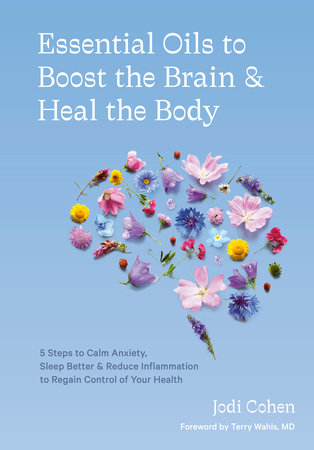Excerpt
Essential Oils to Boost the Brain and Heal the Body
Foreword Essential oils have played a powerful role in my ability to transform lives and heal. I have been using essential oils as part of my own daily health routine since 2008. Efforts to improve my quality of sleep are what initially led me to them. I started applying chamomile and lavender before bedtime to help me relax and calm my nervous system. The oils worked so well and so immediately that I began to gradually experiment with different oils and various combinations of oils.
I recommend the use of plant-based essential oils in my best-selling book
The Wahls Protocol: A Radical Way to Treat All Chronic Autoimmune Conditions, as I believe they contribute to the plant diversity necessary to keep you healthy. As Jodi thoroughly explains in this book, the concentrated essences of plants work on many levels, including the physical, neurological, and psychological.
Humans are meant to consume hundreds of different plant species each year, not just a handful. More diverse plant consumption adds to greater resiliency and health. As your body digests plants, thousands of metabolites (substances that are produced when the body breaks down food and chemicals) are absorbed by your gut into your bloodstream. Scientists are recognizing that these metabolites have a major impact on our risk of heart disease, autoimmune disease, mental health problems, obesity, diabetes, and even cancer. These metabolites from the digestion of a wide variety of plants contribute to how our cells do the chemistry of life. Our physiology works much better with the thousands of metabolites that come from eating a greater diversity of plants. The reality is that the food we eat is a combination of things that are incredibly good for us and a few things that are terrible for us. So, if we have variety in our diet, more diversity of foods over the week and the year, the fewer problems we will have and the more health benefits we will enjoy.
I encourage the addition of essential oils in your self-care program along with different vegetables, spices, and teas as sources of plant diversity. There are literally hundreds of essential oils and spices that you can integrate into your life to expose yourself to at least two hundred different plant species in a year.
Jodi’s extensive research helps support and validate my own personal experience with essential oils, which have improved my well-being and reduced some of my subtle symptoms, like pain, headaches, constipation, and low mood. I now use cypress and frankincense most reliably, along with a blend that includes lavender, marjoram, Roman chamomile, sandalwood, vanilla, and ylang-ylang to calm my nervous system.
For self-care, my favorite ways to use essential oils are inhalation, self-massage, and in hot or ice-cold Epsom salt baths. My favorite technique involves massaging the vagus nerve and the lymphatic tissue on the sides of the neck. I start from behind my ear and massage the oils down my neck on both sides and combine that with three to five deep inhalations in each nostril before bedtime.
When I look at essential oils through a food lens, I know that essential oils are interacting positively with our biochemical pathways and nervous systems, even calming excessive inflammation. The inhalation of essential oils activates the same pathways in the brain. The topical application of essential oils on the skin ensures they are entering the bloodstream and affecting the body’s pathways.
Essential Oils to Boost the Brain & Heal the Body takes these suppositions one step further, helping to explain not only how essential oils work but also the best ways to use them to combat underlying health conditions. This book is a wonderful guide for using essential oils as a powerful self-care tool to help you make steady improvements and refinements in your health.
—Terry Wahls, MD, author of
The Wahls Protocol




